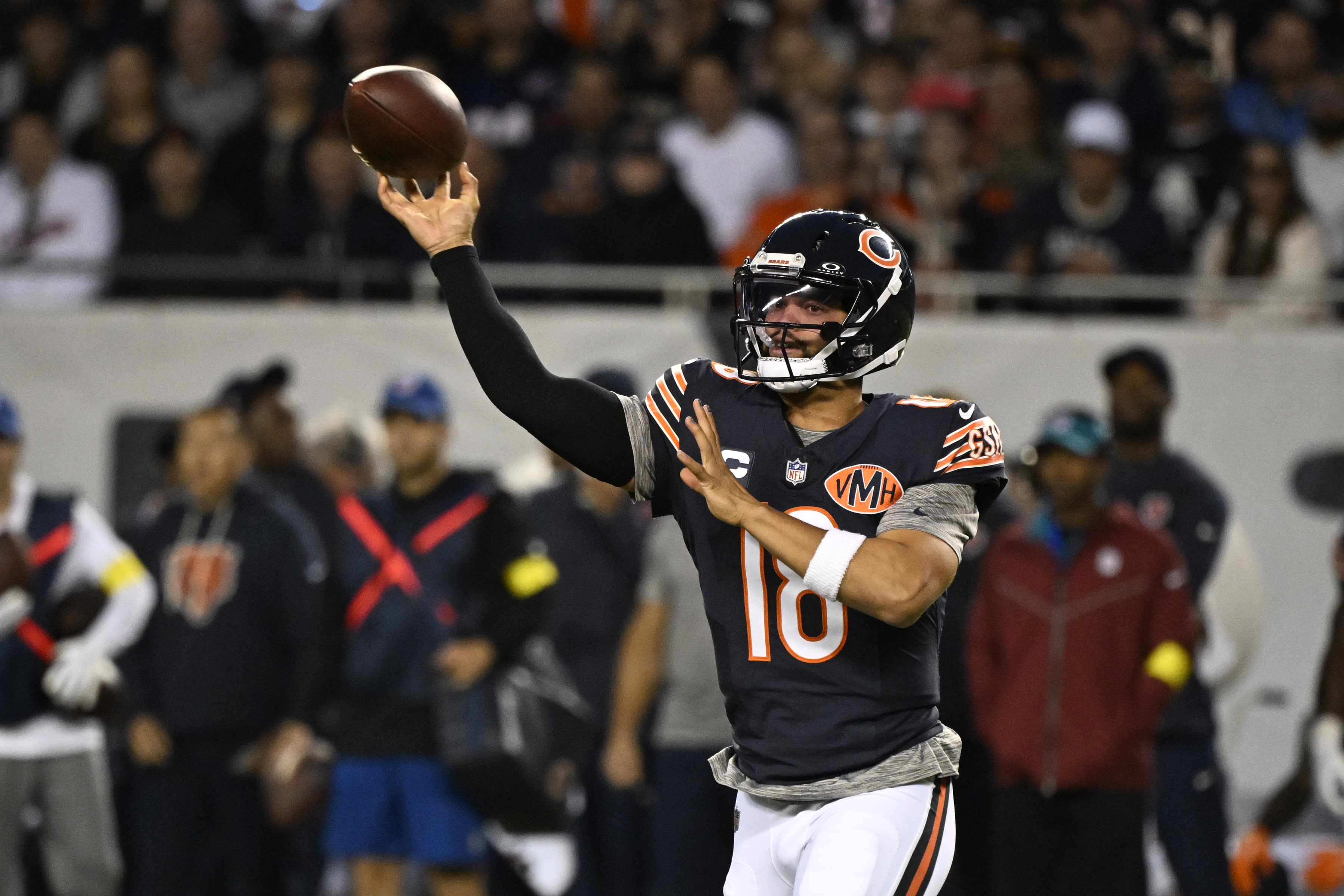Among players, there’s excitement but also quiet curiosity. Several veterans have privately noted that Williams’ leadership style is more outspoken than Fields’ ever was. He challenges receivers in practice, praises linemen publicly, and carries himself with the conviction of a ten-year veteran.
“Caleb brings juice,” tight end Cole Kmet said. “He’s confident, vocal, sometimes fiery — but that’s what we’ve missed. The energy feels different.”
Meanwhile, Johnson has already been spotted reviewing film with offensive linemen, adjusting protection schemes on the fly. His attention to detail borders on obsessive. “If one motion is off by half a second, he notices,” said one offensive assistant. “He’s surgical.”
That precision made him one of the NFL’s most sought-after coordinators. But will that same discipline stifle the creativity that makes Williams special?
Chicago’s football culture has always revolved around defense — toughness, grit, and low-scoring brawls in the cold. Yet as the modern NFL shifts toward high-octane offense, the Bears are finally trying to evolve. The challenge? Doing it without losing their soul.
“I think Caleb represents a break from our past,” said lifelong fan Tony Ruiz, who’s attended games since 1984. “We’ve never had a quarterback like him. But we’ve also never trusted one to lead. Maybe that’s the real fix — trusting him.”
Social media echoes the same mix of excitement and anxiety. Fans debate whether Johnson’s system can unlock Williams’ improvisational genius or cage it. Some point to Patrick Mahomes’ partnership with Andy Reid as proof balance is possible. Others fear another Fields-like mismatch — brilliance trapped in a system built for someone else.
A Lesson from Detroit
Ben Johnson’s rise with the Lions offers clues. In 2021, Detroit’s offense was a mess — predictable and lifeless. Within two years, Johnson transformed it into a top-five unit, not through flash but design. His playbook emphasized motion, disguise, and perfect spacing.
“He made Goff comfortable,” said NFL analyst Mina Kimes. “He didn’t ask him to be Mahomes. He asked him to be precise. And it worked.”
That success is what drew Chicago’s interest. But Caleb Williams is no Jared Goff. He’s more explosive, more daring — and less predictable. The question is whether Johnson can adapt his system to the player, not the other way around.

Beyond philosophy, both Williams and Johnson agree on one thing: Chicago’s roster needs more help. The offensive line remains thin. The wide receiver corps, led by DJ Moore and rookie Rome Odunze, offers promise but little depth. The tight ends are solid but not elite.
Williams has reportedly pushed for a more aggressive free agency approach next offseason, especially at tackle and slot receiver. Johnson, meanwhile, has prioritized drafting “system fits” — players who understand timing-based offenses.
This tension mirrors deeper questions about how the Bears will rebuild: fast and flashy, or slow and methodical?
“Teams die when they chase both,” one NFC executive warned. “You need one clear philosophy.”
Moments of Understanding
Despite differences, there are glimpses of alignment. During a recent practice, Johnson praised Williams for checking out of a blitz look and hitting a 40-yard seam pass to Kmet. Later, Williams walked over and said, smiling, “See, coach? Chaos has rhythm too.” Johnson laughed — and nodded.
That exchange captured the essence of their relationship: push, pull, and progress.
“You can tell they respect each other,” said linebacker T.J. Edwards. “It’s like watching two chess players — one thinking five moves ahead, the other playing from instinct. Somehow, it works.”
Above them, the pressure mounts. Ryan Poles’ job security hinges on this partnership succeeding. Chicago’s ownership has already signaled that patience will be limited. The city has waited too long for an offensive identity, and expectations are sky-high.
“If this doesn’t work, we’re back to square one,” one front-office source admitted. “But if it does… it could change everything.”
Williams knows it too. During a post-practice interview, he looked directly into the camera and said: “I didn’t come here to blend in. I came here to build something Chicago’s never had.”
The crowd of reporters fell silent — and for a moment, even skeptics believed him.
The Emotional Core
What makes this story resonate isn’t just football. It’s human — two leaders trying to merge vision and vulnerability under crushing expectation. Williams carries the weight of a city’s hope; Johnson carries the fear of failing to harness it.
In a way, they mirror Chicago itself — stubborn, proud, hungry for redemption. Every snap, every adjustment, every disagreement is part of something bigger than a rebuild. It’s a reckoning.
“Chicago’s offense isn’t just about points,” sportswriter David Haugh said. “It’s about identity. For decades, the defense defined us. Now it’s the quarterback’s turn.”
A Future Yet Unwritten
As training camp looms, both men seem to be finding common ground. Williams has started studying Johnson’s play concepts in greater depth, while Johnson has incorporated more improvisational drills — letting receivers adjust routes when plays break down.
The early results are promising. During an open scrimmage, Williams led a two-minute drill capped by a 27-yard touchdown to Odunze. Fans erupted. Johnson clapped quietly, then whispered to him: “That’s how we build it — together.”
Maybe that’s how it has to be — not Williams’ offense or Johnson’s, but Chicago’s.
For a franchise starved of offensive joy, the fix won’t come from one philosophy or one man. It’ll come from trust — built slowly, tested fiercely, and forged in the cold winds off Lake Michigan.
If they get it right, the Bears might finally stop chasing the ghost of what they’ve never been — and start becoming what they were always meant to be.

.jpg)





